A review of the week’s plant-based nutrition news 18th July 2021
This week I summarise my keynote speech at the Australian Doctors for Nutrition Independent UN Food Summit Dialogue.
This week, Doctors for Nutrition from Australia took the opportunity of hosting an Independent UN Food Summit dialogue, bringing together key stakeholders to discuss the diet and food system in Australia and how the National Dietary Guidelines (NDGs), which are currently under review, are an important lever for change. I was honoured to give one of the keynote speeches but only had 6 minutes to highlight some important messages! Below I summarise my key points and refer to some important papers and reports on the topic of diet, health and sustainability.
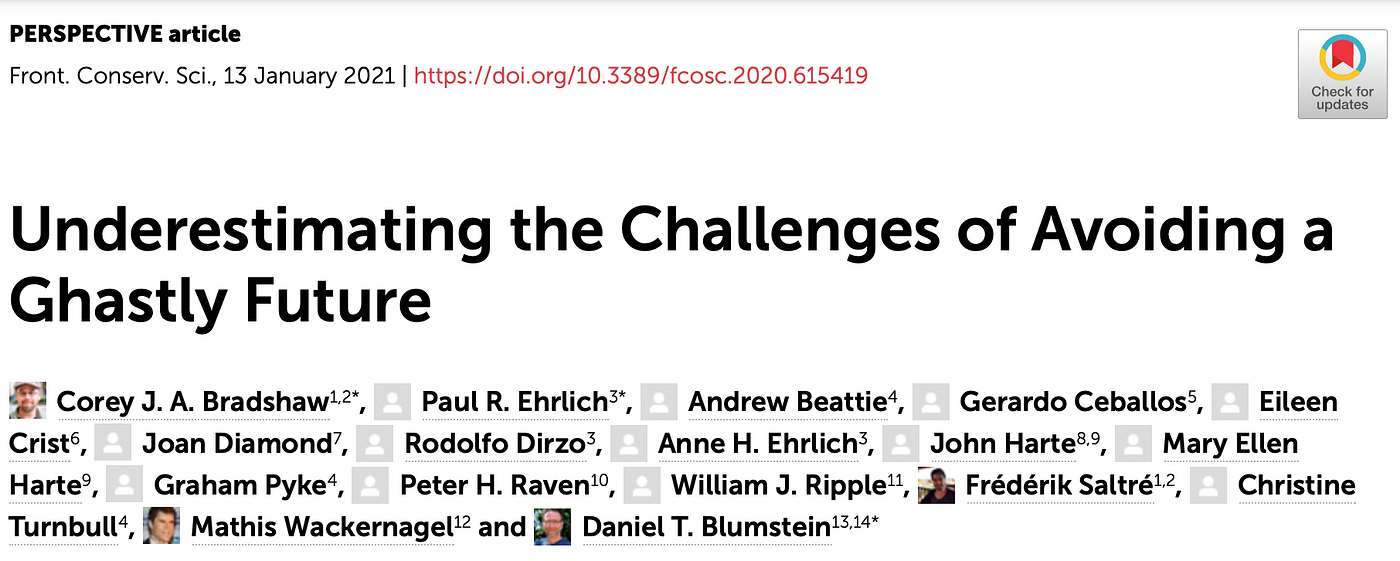
FOOD SYSTEM AND GLOBAL CRISES: Our food system is at the centre of 4 urgent global crises. Health, climate, biodiversity and soil. There is also a 5th crisis, one of ethics, whereby our food system harms people and animals and keeps nearly a billion people hungry, despite producing enough food to feed 10 billion. In addition, our food system is a major driver of antibiotic resistance, air pollution and pandemic risk, all global issues adversely affecting health.
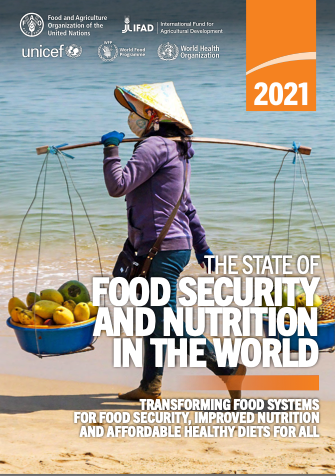
REQUIREMENTS OF A GOOD FOOD SYSTEM: The global food system needs to provide healthy and nutritious food, be sustainable for producers, society and the planet, be affordable and accessible, culturally adaptable and also kind and compassionate. Currently, the global food system fails to meet these requirements.
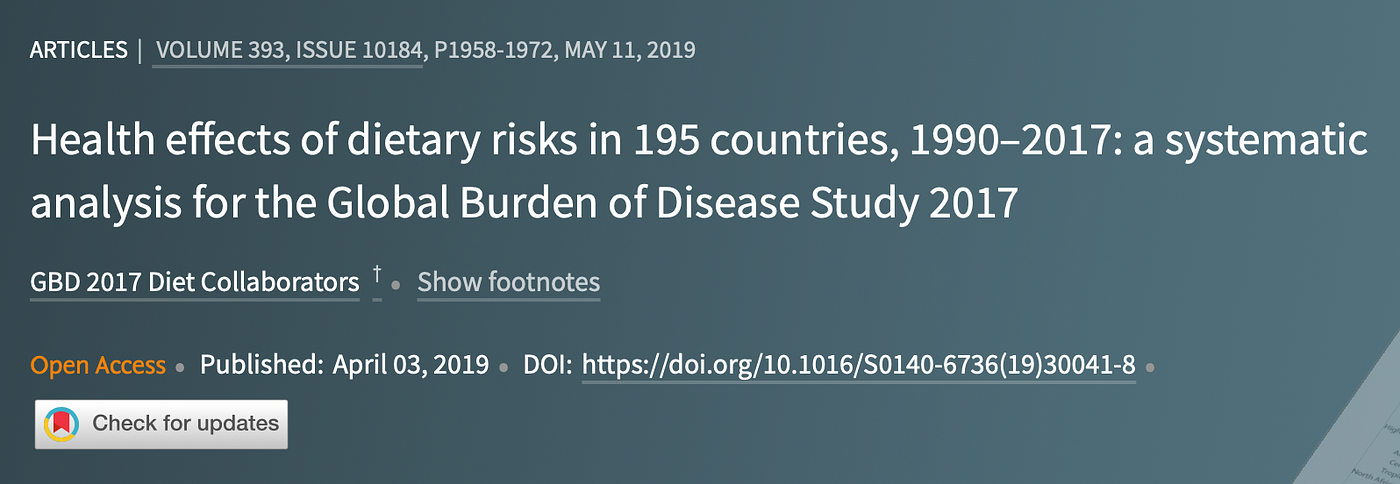
DIET-RELATED DISEASES: One in 5 deaths globally are a direct result of an unhealthy diet. A diet that is too high in animal-derived and processed foods and too low in whole plant foods. A review of global diets in 195 countries concluded that ‘a suboptimal diet is responsible for more deaths than any other risks globally, including tobacco smoking’. These deaths are predominantly due to cardiovascular disease, cancer and type 2 diabetes.

URGENT TRANSITION TO A PLANT-BASED FOOD SYSTEM: A large number of reports over the last year have emphasised the need for an urgent transition to a plant-based food system for both human and planetary health. I highlight a report by The Eat Forum titled ‘Diets for a better future’. The report examined how NDGs in G20 countries need to be shifted to improve human health and environmental outcomes. The foods associated with the greatest benefits for health and the lowest environmental impact are fruits, vegetables, whole grains, legumes, nuts and seeds. However, current dietary patterns in the majority of G20 countries far exceed food system planetary boundaries and even if citizens followed their country-based dietary guidelines, food system planetary boundaries would still be exceeded. If all countries consumed the diet of high-income countries we would need 7 planets to feed the World! Of course, the impact of these unsustainable diets, such as climate change and biodiversity loss, is felt more acutely in low incomes countries, who contribute the least to these harms and have less resilience to cope.

THE CURRENT FOOD SYSTEM HARMS NATURE: This report from Chatham House clearly highlights how global food production is degrading or destroying soil, natural habitats and contributing to species extinction. To change this trajectory we need to change dietary patterns to reduce food demand and encourage more plant-based diets, protect and set aside land for nature and shift to more sustainable farming methods.

SUSTAINABLE DEVELOPMENT GOALS. It is clear, that without addressing global diets, we will not be able to meet the Sustainable Development Goals or limit global warming to below the 1.5 degree Celsius set by the Paris Agreement in 2015.
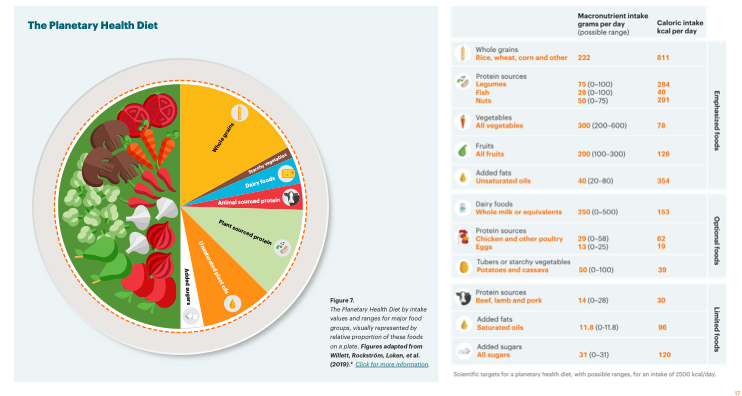
THE PLANETARY HEALTH DIET created by the Eat Lancet commission is a reference diet that will keep the food system within planetary boundaries whilst improving human health and preventing an estimated 11 million deaths globally per year. It is a predominantly plant-based diet with animal foods considered to be optional and if consumed, contributing to less than 15% of energy intake. This amounts to one portion of red meat per week, 2 portions of poultry and 3 eggs for example. This type of diet would be expected to be culturally and geographically adapted but what is clear is that in high-income countries such as UK, USA and Australia, radical shifts in guidelines and diets need to be made as shown in the image below. Red and processed meat consumption would need to be cut by 400% whereas the consumption of whole plant foods would need to be doubled.
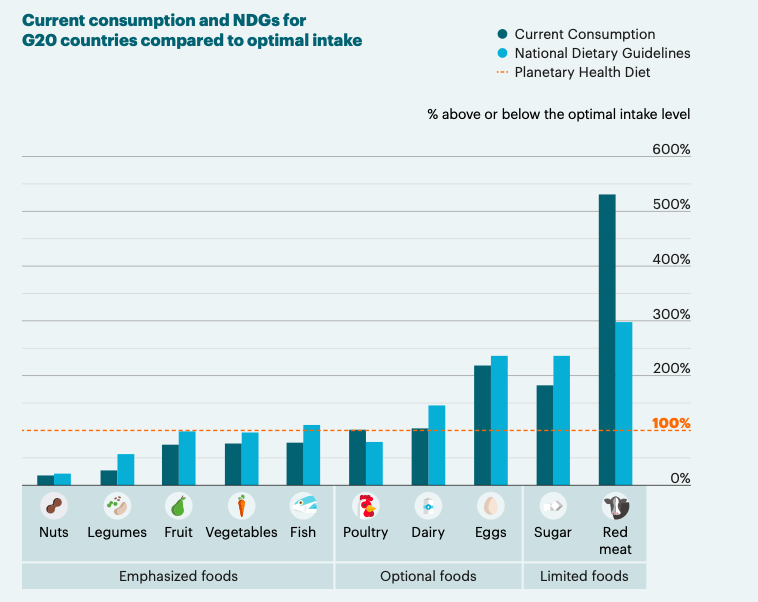
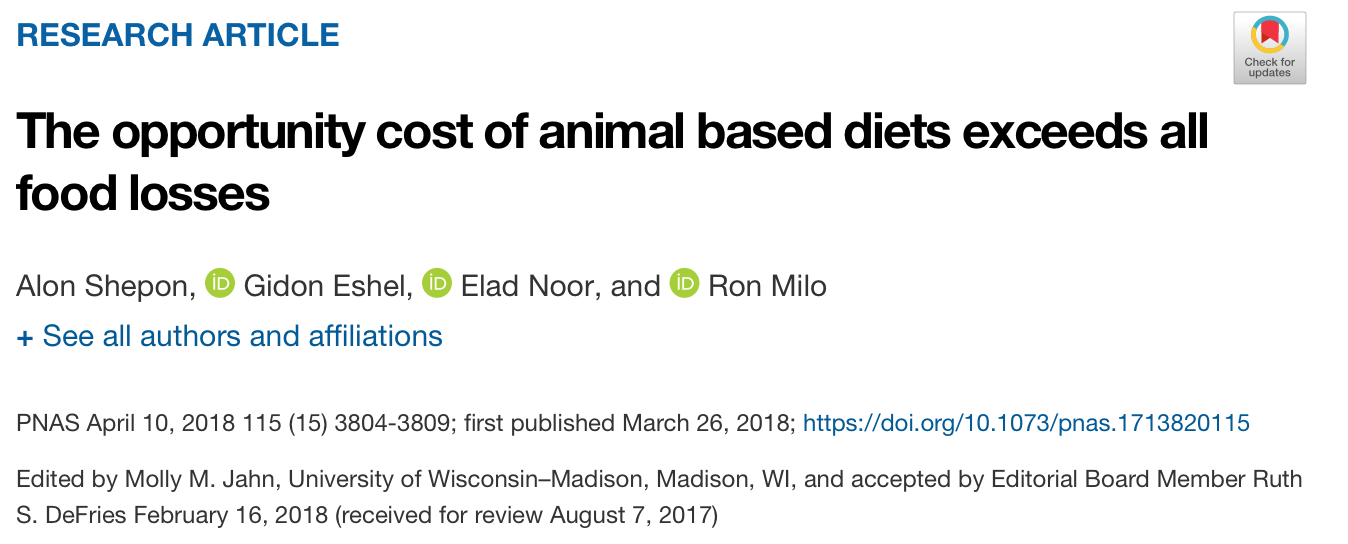
WE CAN FEED THE WORLD ON A PLANT-BASED DIET: A common misconception is that a plant-based food system cannot produce enough food to feed 10 billion people. However, the science refutes this argument. The paper highlighted shows that in the United States, plant-based replacements for each of the major animal categories, beef, pork, dairy, poultry, and eggs, can produce twofold to 20-fold more nutritionally similar food per unit cropland. Replacing all animal-based items with plant-based replacements could add enough food to feed 350 million additional Americans, more than the expected benefits of eliminating all food waste.

COST OF HEALTHY DIETS: Some but not all studies have shown that healthier, more sustainable diets are not necessarily more expensive than current diets. The paper highlighted is from the UK and shows that a shift towards a diet more in line with the Eatwell Guide would not significantly alter cost. Similarly, a study from Australia showed that shifting to the Planetary Health Diet could be cheaper than the current diet of metropolitan-dwelling Australians. Nonetheless, we have to appreciate that currently healthy diets are likely to be unaffordable for low income households, costing more than 30% of disposable income in Australia. In the UK, the 2021 Broken Plates report from The Food Foundation shows that the poorest fifth of UK households would need to spend 40% of their disposable income on food to meet Eatwell Guide costs. This compares to just 7% for the richest fifth. This is where we need to find local solutions to ensure healthy and sustainable diets are in fact affordable for all.

NATIONAL DIETARY GUIDELINES present a huge opportunity to facilitate the transition to a healthy and sustainable diet. The study highlighted analysed NDGs of 85 countries and concluded that although the adoption of these guidelines have the potential to reduce premature mortality, they could do better in terms of healthiness and in addition, most were not compatible with meeting global environmental targets; ‘Providing clearer advice on limiting in most contexts the consumption of animal source foods, in particular beef and dairy, was found to have the greatest potential for increasing the environmental sustainability of dietary guidelines’.

PLAN(E)T-BASED DIETS: The world wildlife fund report on the restorative power of planet-based diets highlights that NDGs are important tools for changing diets and acting as a bridge between global dietary recommendations and local context and relevance. Yet they conclude that current NDGs are not ambitious enough to achieve global goals and commitments. Some countries are taking significant steps to promote healthy and sustainable dietary patterns. Canada recently launched a food guide that recommends half the plate of vegetables and fruits, a quarter of the plate wholegrain foods and emphasizes obtaining protein from plant-based sources such as beans, lentils and nuts. Additional, dairy has been removed as a food group.


THE UK NATIONAL FOOD STRATEGY: There is some good news from the UK. Just published is the final report of the National Food Strategy. The recommendations are bolder than I imagined they would be. These include further taxation on unhealthy, processed foods, prescribing of fruits of vegetables by family doctors to reduce health inequalities related to diet, better use of our land including repurposing of farmland for nature restoration, supporting farmers to use their land more sustainably, investing in a better food system including growing more fruits and vegetables and better and appropriate use of taxpayers money when buying food for schools, hospitals and prisons. The report acknowledges that ‘One of the most effective ways to reduce carbon emissions and free up land for nature is to cut back on animal proteins. 85% of the land used to feed us is used for livestock farming, even though meat and dairy only account for one third of our calories. Plant-based proteins produce, on average, 70 times less greenhouse gas emissions than an equivalent amount of beef, and use more than 150 times less land’. They recommend the development of a reference diet that will meet health and sustainability goals including the changes to consumption habits shown in the graph below. Unfortunately, no recommendations to cut dairy consumption. The report also pays attention to issues related to animal welfare (although sadly not to animal right or justice).
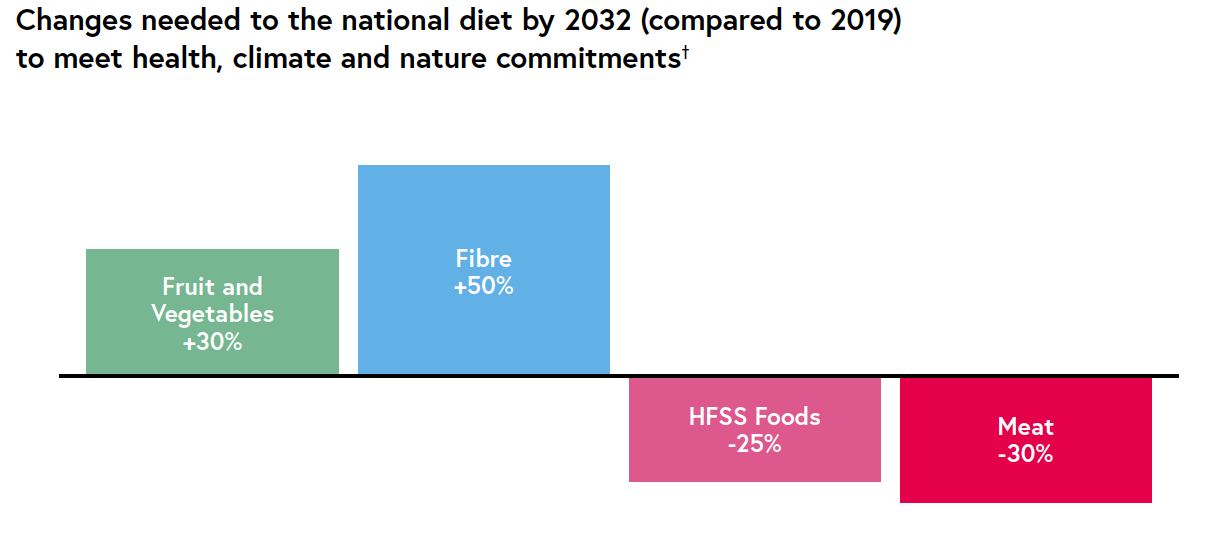
We have a lot of work to do in the UK. Just taking vegetable consumption as an example as highlighted by the 2021 Veg Facts report; 18000 premature deaths in the UK are caused by not eating enough vegetables and legumes; about one third of children aged 5–10 years don’t even eat one portion of veg a day; 23% of children aged 11–16 eat less than a portion of veg a day; baked beans and pizza make up 16% of a child’s veg consumption; 77% of adults are eating less than the recommended 3–5 portions of vegetables a day; only 1.9% of food and drink advertising budget is spent on promoting veg consumption; household income impacts vegetable consumption with the poorest households eating the least; 15–20% of veg is consumed in the form of ultra-processed foods. The UK currently has 4.6 million metric tonnes of vegetables available, of which it produces 53%, that is, 2.4 million tonnes. For the UK population to meet 5-a-day (assuming half comes from veg) there would need to be 5.4 million tonnes available or 7.6 million tonnes for 7-a-day.
IMPLEMENTATION: Overall, the science is clear on what constitutes a healthy and sustainable diet. The challenge comes with implementation. Access to healthy, nutritious food needs to be considered a human right. Governments need to focus on supporting farmers to produce the food that promotes health in sustainable farming systems. We need to control advertising and marketing of foods that cause harm. Our education systems need to support the implementation of dietary guidelines and they need to be showcased in all public sector settings. We also need to acknowledge, learn from and support Indigenous farming systems, because for millennia, Indigenous Peoples have been protecting their environment and biodiversity.
CONCLUSION: The good news is that we can each make a positive contribution as the power really is on our plate.
Please follow my organisation ‘plant-based health professionals UK’ on Instagram @plantbasedhealthprofessionals and facebook. You can support our work by joining as a member or making a donation via the website.
